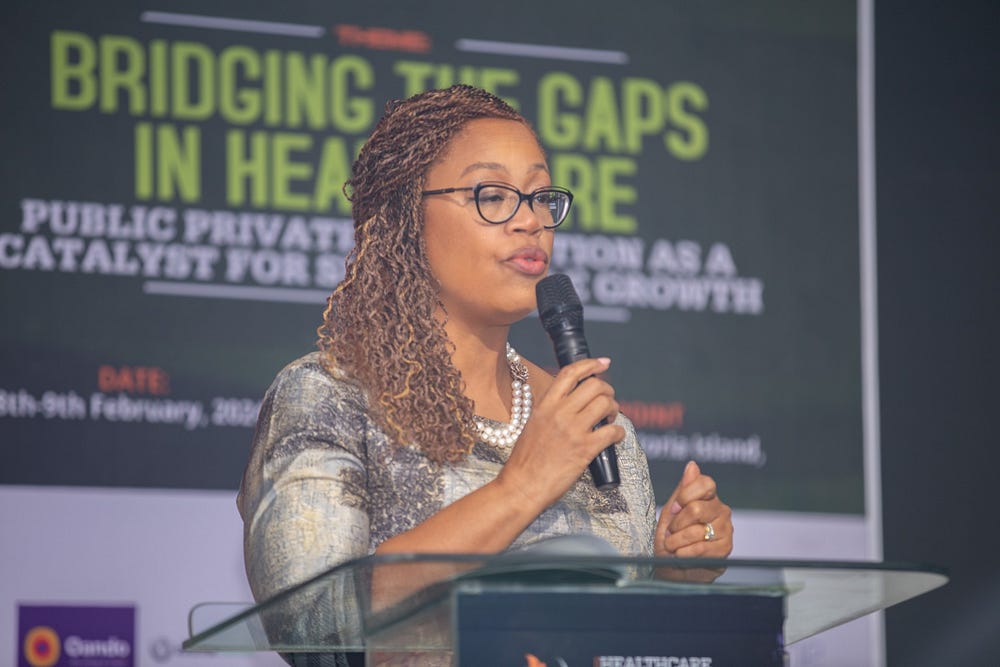Alexander Chiejina and Emeka Oguanuo (Lead writers)
Public-private integration holds immense potential to significantly build resilience and strengthen Nigeria’s healthcare system to improve health outcomes for its citizens.
Nigeria operates a mixed health system involving both the public and private sectors who play distinct roles in providing healthcare services to the Nigerian population. The nation’s public health system, organised into three tiers, with the local, state, and federal governments being responsible for primary, secondary, and tertiary health care, respectively. Public health facilities provide healthcare services, often at a reduced cost, and rely on funds provided by the government.
The private sector contributes to healthcare delivery by filling the gaps in public sector healthcare provision, playing a critical role in strengthening the country’s overall healthcare system. The private health sector provides a mix of products and services including direct provision of health services, medicines and medical products, financial products, training for the health workforce, information technology, infrastructure, and support services (such as health facility management, and health insurance schemes).
Public-private integration goes beyond partnership, bringing together private sector efficiencies into public healthcare structures, encouraging collaboration and sustainable, integrated health service delivery. Therefore, public-private integration is critical for complete healthcare coverage, quality, innovation, and better health outcomes.

Bridging the healthcare gap
Despite the government’s budgetary allocations to the health sector over the years, Nigeria has yet to fulfil the commitments made in the Abuja Declaration of 2001. The country’s headline inflation rate in Jauary 2024 stood at 29.9%, marking the highest in three decades, significantly undermining the value of government investments in healthcare. As Africa’s most populous country, Nigeria faces considerable challenges in achieving adequate healthcare funding and delivery. However, the question remains — how can we bridge the gap between government allocations and the pressing healthcare needs of the population?
Integrating Nigeria’s private sector with public healthcare can address funding and service delivery gaps. This synergy can expand access, enhance quality, and increase the efficiency of healthcare services across the nation. The private sector already contributes to expanding healthcare access, leveraging its resources and technical expertise.
This formed the crux of the 2-day Healthcare Federation of Nigeria (HFN) Annual Conference titled “Bridging the Gaps in Healthcare: Public-Private Integration as a Catalyst for Sustainable Growth” where participants shared insights into the policy landscape shaping public-private collaboration in healthcare, innovative policy frameworks, and regulatory incentives, that are key to catalysing partnerships, stimulating investments, and accelerating progress toward a more inclusive and resilient health system in Nigeria. With seventy (70%) of healthcare delivery in Nigeria provided by the private sector, Dr. Pamela Ajayi, President, Health Care Federation of Nigeria (HFN), emphasised the critical role of public-private integration for health service delivery in Nigeria.

Dr. Tunji Alausa, Honourable Minister of State for Health and Social Welfare in his opening remarks at the HFN conference disclosed that the private health sector has the potential and capacity to fill the gaps and constraints faced by government-financed and government-provided healthcare.
“With a growing population of over 220 million Nigerians, I have met with major players in the private sector in our healthcare delivery system and encouraged them of government support in private investment in infrastructure; investment in the secondary and tertiary-care provision, mobilisation of additional resources to meet our increasing needs, a strong network of the supply chain that guarantees effectiveness, as well as the introduction of new services and products that enable the ease of healthcare delivery,” Dr. Alausa explained.

The provision of healthcare services in African health systems is largely financed by the private sector. An estimated 35% of outpatient care in sub-Saharan Africa is provided by the for-profit private sector, with an additional 17% coming from unofficial private providers Utilisation varies both within and between nations; Nigeria has the highest percentage of private sector care seekers (52%), followed by Benin, Cameroon, and Uganda, according to the World Health Organisation (WHO). With technological advancements and investment in telemedicine and other digital health solutions, the private health sector has increased access to specialists and consultations, particularly in remote areas.
Private insurance programmes have also expanded, particularly in cities with sizeable affluent populations or sectors of the economy able to support sizable worker plans.
Here-in lies the conundrum
Public-private integration is essential to closing the healthcare gap in Nigeria. However, the private health sector in Nigeria faces several challenges that impact its effectiveness and accessibility. Issues like navigating complex regulations and licensing requirements, difficulties importing health and medical supplies, burdensome rules, unimplemented custom codes for duty-free importation of essential medical equipment and multiple taxation continues to impact the private health sector in Nigeria.
To address these challenges, there needs to be a review of such regulations by the federal government. Taiwo Oyedele, Head of the Presidential Committee on Fiscal Policy, and Tax Reforms, disclosed in his presentation at the conference that onerous tax systems on life-saving medical equipment, accessories, and raw materials for drug production are currently being reconsidered. He affirmed that continued efforts are being made to put modifications into effect by developing new, harmonised tariff lines and codes that take medical research breakthroughs into account.

“Plans are also in motion to create dedicated passageways for the quick approval of pharmaceutical exports and imports”, Oyedele stated. He noted that higher taxes on cigarettes, sugar-sweetened beverages, alcohol, and spirits might be implemented to fund healthcare. The purpose of this review is to make sure that these taxes do not worsen unemployment by failing to adequately address healthcare issues.
Oyedele cautioned that unless specifically designated by legislation, additional taxes may not materially improve healthcare even if they do raise money.
Unlocking private sector opportunities
In a bid to unlock the healthcare value chain in Nigeria, President Bola Ahmed Tinubu (GCFR) recently approved the appointment of Dr. Abdu Mukhtar to serve as the National Coordinator of the Presidential Initiative for Unlocking the Healthcare Value Chain (PVAC), which is domiciled under the Federal Ministry of Health & Social Welfare. This strategic initiative seeks to unlock funding for new investment into the nation’s healthcare delivery system. The approach leverages time-bound and cross-ministerial collaboration to restructure the ecosystem of health product manufacturing, health logistics services, health technology services, health retail services (eCommerce); aiming for a measurable increase in the domestic manufacturing of generic pharmaceuticals, vaccines, biologics, and devices, and a reduction of outbound medical tourism by enhancing service quality in Nigeria.

There is no denying that PPPs of all sizes and models require strong regulatory frameworks and supportive public institutions. At the national level, sector reform, framework development, and demand creation support will strengthen the enabling environment for public private integration. At sub-national levels, the public sector can provide capacity building, technical assistance, and guidelines for health start-ups eager to enter the health sector.
Public-private integration can not only bridge the current healthcare gap, but would also enable a model of healthcare delivery that is more resilient, innovative, and capable of meeting the diverse needs of Nigerians. It would require the government taking active steps to streamline regulations and foster an environment conducive to private sector involvement, leveraging much-needed efficiency and expertise.


